Plus RIGHT HERE I announce the new Logline Showdown
I’ve got a car-raaaaaaaaa-zay newsletter for you guys. Check this out. I GO BACK IN TIME! This is what I do for you guys. I secured myself a time machine and went back in time to do a script review. I was told there was a 17% chance of dying and I still did it. FOR YOU. So you better be appreciative. And I’m totally serious here. I swear on my life I went back in time. But that’s just one part of the newsletter. I also give out some final advice on first pages, a realization I had only after the First Page Showdown had ended. But it’s an invaluable tip, so you’re going to want to check it out. I also realized there are some really cool looking shows coming out that I hadn’t heard of. Why didn’t any of you tell me about these shows?!! I also review the trailer for the worst TV show that’s ever been made, based on a gigantic book and starring a controversial actress. I may get cancelled for my review of that one so you’ve been warned.
Okay, onto October’s Logline Showdown…
IT IS HALLOWEEN LOGLINE SHOWDOWN!
It’s Halloween month, people. You know what that means. It means Scott isn’t going to be happy and we’re going to try and discover the next great horror or thriller script. But really, if the script is even peripherally related to horror, you can submit it. Here’s what I need…
What: Halloween Logline Showdown
Send me: Logline for either your Horror or Thriller script (Pilot scripts are okay!)
I need: The title, genre, and logline
Also: Your script must be written because I’ll be reviewing the winning entry the following week
When: Deadline is Thursday, October 19th, by 10:00pm Pacific Time
Send entries to: carsonreeves3@gmail.com
Last week over 250 writers sent me the first page of their screenplay. Only 6 of those made it to the First Page Showdown. Here are 10 that didn’t make it. I explain why.
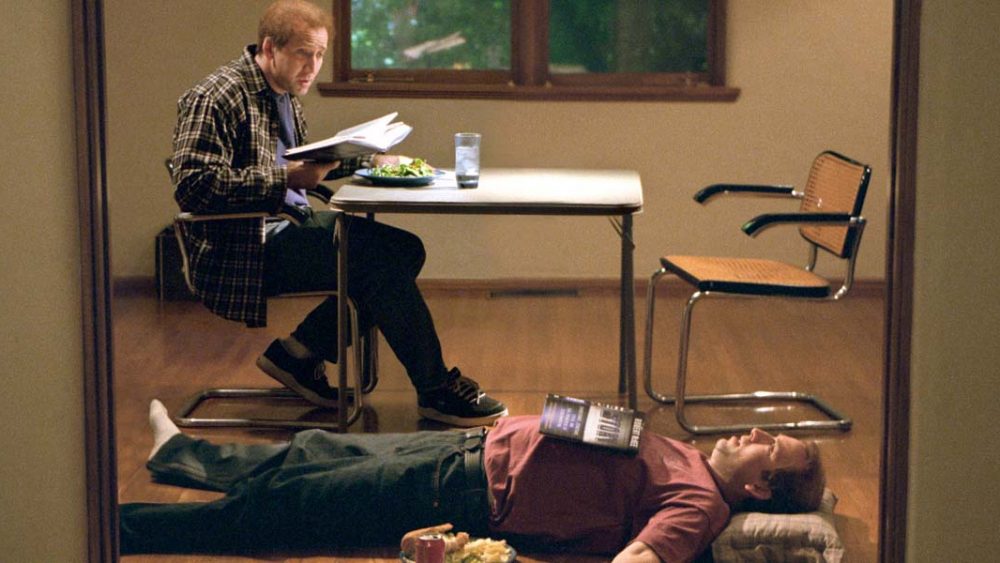
***SUPER DEAL*** I’ve decided to give out four SUPER-DEALS this weekend. If you’ve got a feature script or a pilot, I can give you 4 pages of stellar notes (with an emphasis on the first page if you want!) for $200. I’m giving out 2 of these with this post and 2 in the newsletter. To get one of the 2 slots here, e-mail me at carsonreeves1@gmail.com with the promo code: SUPER DEAL. Hurry up. They’ll disappear quickly! ***SUPER DEAL***
Okay, an update on the First Page Showdown. Our winner, Neobiata, it turns out, doesn’t have a full screenplay for his entry. I told him to write it over the next two months and I would review the script when he’s finished. But this is not going to become a regular thing. So don’t think you can start entering loglines into Logline Showdown and write the script later if you win. I’m allowing this because it’s the first time it’s happened and I’m feeling nice!
So I’ll review the second place script next week. I’m putting all of my focus on the newsletter right now, which is going to be a blast. After my Ripple review, someone contacted me who has access to a time machine, which they’re sending to me. It can only be used once and I have a really fun way to use it that I’m going to save for the newsletter. If you want to be on my newsletter list, e-mail me at carsonreeves1@gmail.com with the subject line, “NEWSLETTER.”
Okay, let’s take a look at some first page entries that didn’t make the cut. I want to take you through my thought process as to why they didn’t make the top six. Hopefully, you can learn something from the analysis. And feel free to tell me that I’m wrong and that one or more of these deserved to be in the competition!
TITLE: BELIEVER
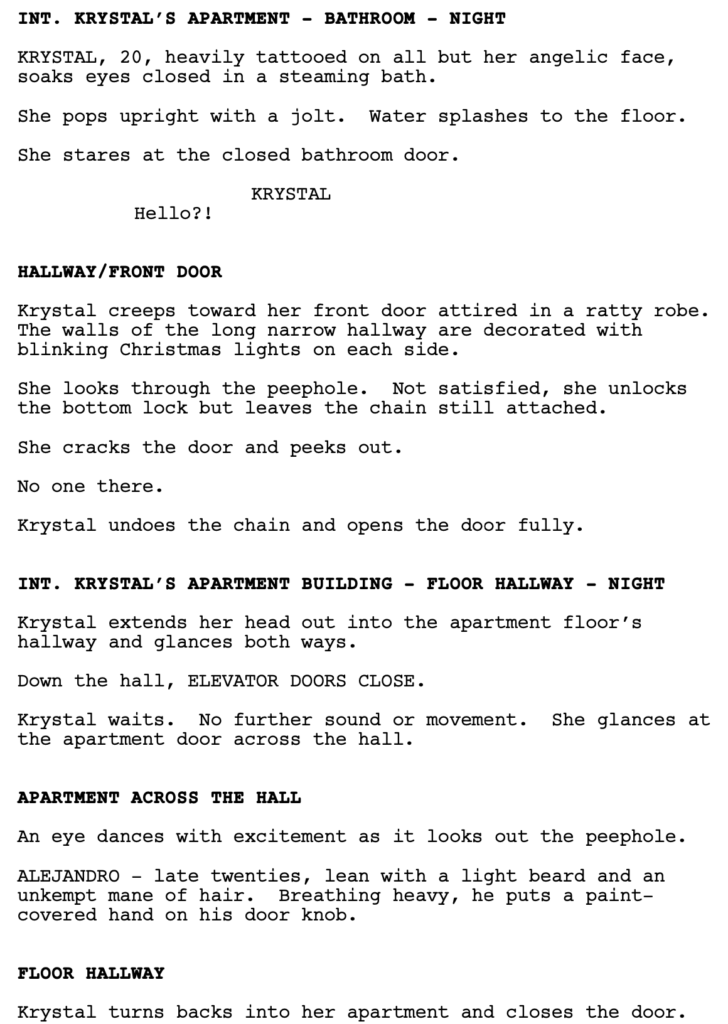
This one lost me at the very first line. “KRYSTAL, 20, heavily tattooed on all but her angelic face, soaks eyes closed in a steaming bath.” It’s too clunky of a sentence. There should be commas surrounding “eyes closed,” but there are not, which makes us read it as “soaks eyes,” which, of course, doesn’t make sense once you get to the trailing, “closed.” So you then have to reset to read the sentence correctly. If you’re making your reader do that on the first line, you’re effed. Very few readers are going to forgive you for that.
The scene actually has a potentially interesting situation going on. You’ve got a mysterious, maybe even threatening, person at the door. A suspenseful beat follows. But then things get confusing. It’s implied that whoever was at the door has left in the elevator. However, we also meet the tenant across from her with a clunky line of its own – “An eye dances with excitement…” – plus I’m not sure if we’re in his apartment (since “APARTMENT ACROSS THE HALL” is presented as a slugline) or we’re still in the hallway. This page could be smoother.
Logline (Thriller): An alcoholic with a history of mental illness escapes a murderer and then fights to make sense of her fragmented “visions” in order to save the next victim before the killer’s twelve-hour deadline.
TITLE: 10 CENT BEER NIGHT
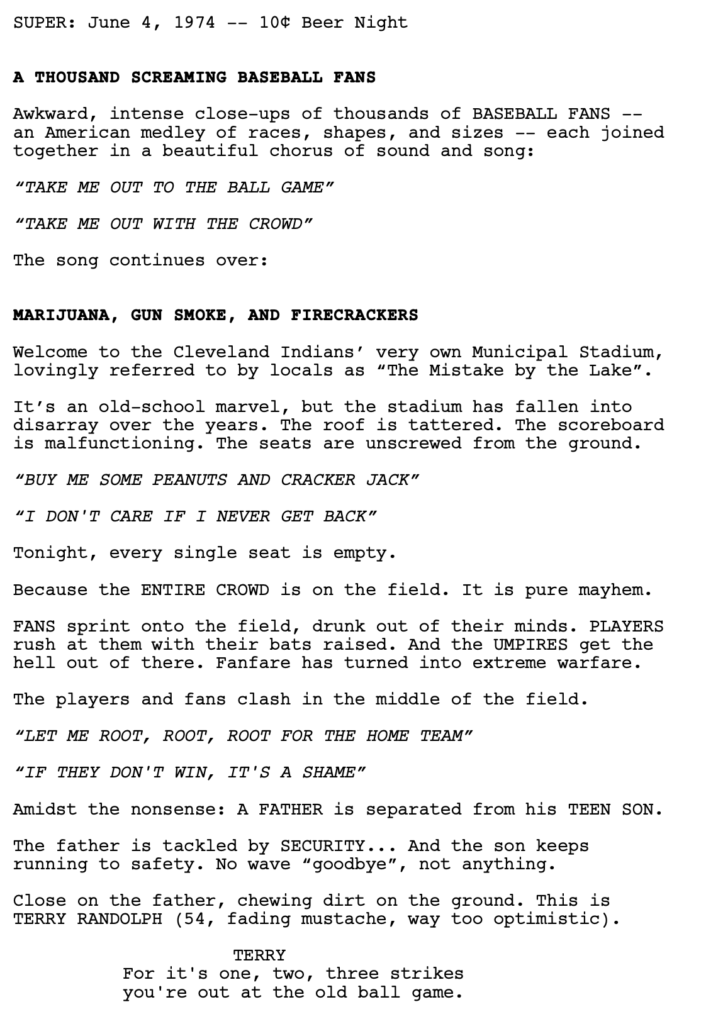
This was actually a pretty good page. Something is going on. The writer does a solid job creating a visual scenario. But as I attempted to consider whether to post it, I read it again and I noticed that something was missing. I couldn’t figure out what it was, at first, but it finally came to me. There was no character to latch onto in the scene. I felt like I was watching everything from a thousand feet above. Later on the page, we do get a dad and his son. But, still, we don’t know these people. They’re not even given a name. So I still feel nothing in a scenario where I should feel everything. This is an interesting premise, though. I would encourage the writer to rewrite this first page and use a character to put us into the mix so that we FEEL what’s happening.
Logline (Comedy): When a well-meaning father tries to celebrate his rebellious son’s 18th birthday, they incidentally attend the most disastrous event in baseball history — Cleveland’s 10¢ Beer Night — and must contend with a crowd of streakers, drunks, and all-out barbarians to survive the night.”).
TITLE: NASTY NEW YEAR
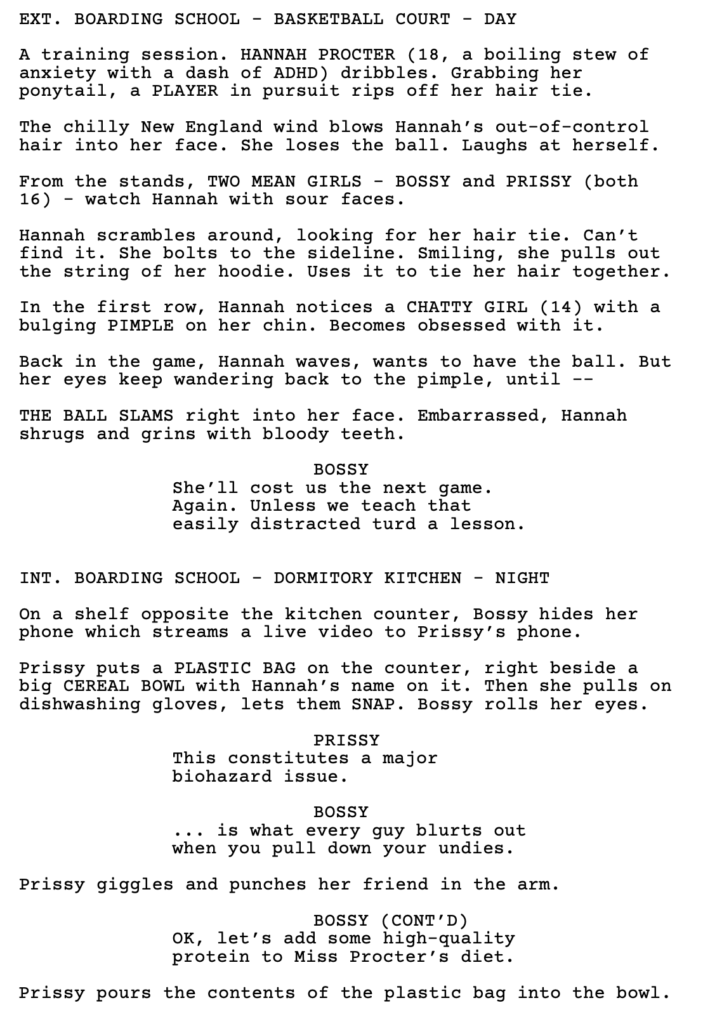
Sometimes it’s one mistake that does you in. That was the case with this page. Here’s where I officially gave up on the entry: “In the first row, Hannah notices a CHATTY GIRL (14) with a bulging PIMPLE on her chin. Becomes obsessed with it.” What does this have to do with anything? You’ve just shown a character lose her focus, then hurriedly regain it in a basketball game… why the random shot of a girl with a pimple and our heroine obsessed with her? I’m now imagining a scene where my heroine is standing in the middle of a game staring at a girl with a pimple in the stands. Maybe if there was a reflective windowed door and our heroine caught her own reflection and saw a pimple on her own face, maybe I could see her becoming obsessed with that. But becoming obsessed with a random fan’s lack of a skin care routine makes me think there are going to be a ton of random moments in this script. I have no interest in that. I like focused narratives with clear plots. This doesn’t appear like it’s going to be that.
Logline (Horror): An anxious young woman whose body has been secretly prepared since childhood to become another mind’s host on New Year‘s Eve must outsmart the devious parasite-to-be – her anti-aging obsessed mother.
TITLE: DERANGED
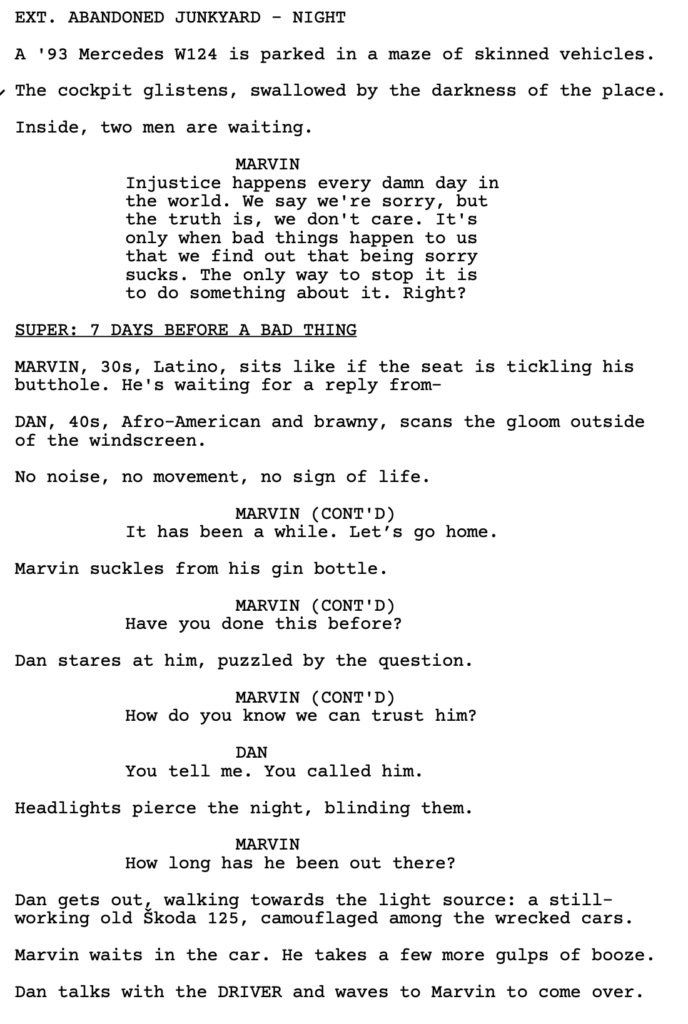
I don’t know what a Mercedes W124 is. So I’m already behind the writer. I don’t know what “skinned vehicles” means. Like their paint is stripped off? I don’t know what, “sits like if the seat is tickling his butthole” looks like. Does that mean he’s having an uncomfortable experience? A joyful experience? Either way, it’s not a good description. To the writer’s credit, they’re creating a bit of suspense here. We want to see who these guys are waiting for. But a lack of clarity in the writing followed by an ill-informed line of description told me that I was going to be getting a lot more of those things if I kept reading.
Logline: A quiet, vengeful husband puts his family in a life-or-death situation when he targets the prime suspect in his wife’s murder: a ruthless Mafia hitman.
TITLE: HALL OF FAME
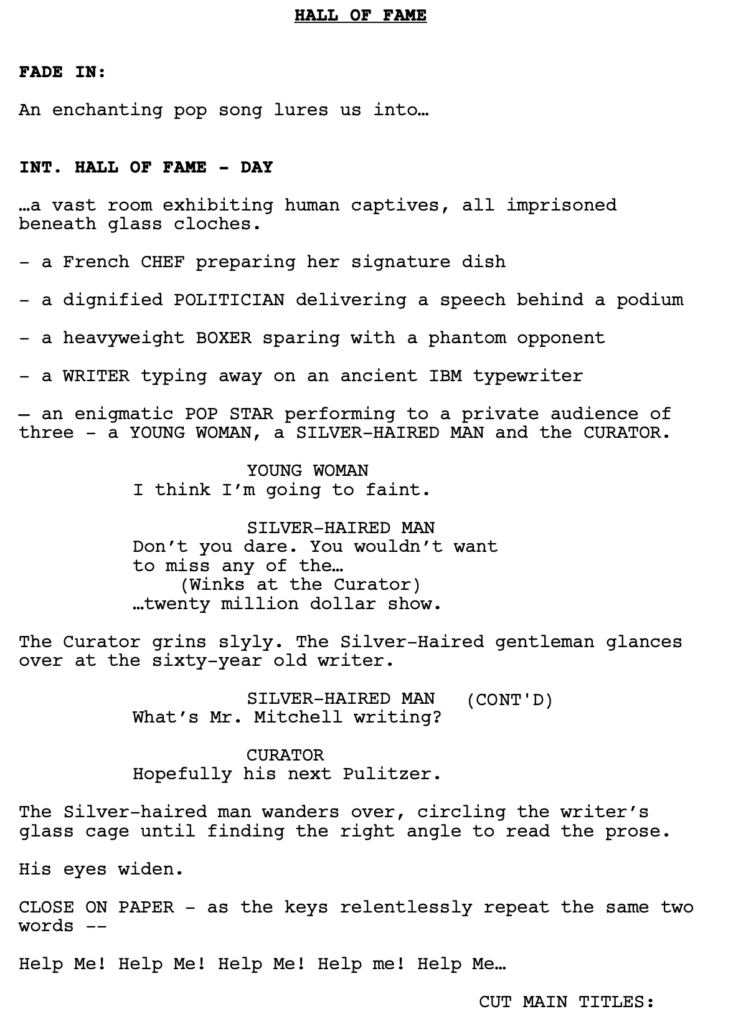
When I see, “Hall of Fame,” I’m thinking ‘sports.’ So I didn’t understand where I was or what was going on at first. In all of my life, I’ve never read the word ‘cloche’ before. You can get away with that sort of thing sometimes, if the word doesn’t matter. But this word is pivotal to the reader understanding what’s going on and since no reader will ever give you the courtesy of looking a word up, you’re pretty much screwed right there.
I was still willing to give the page a chance but then we get “sparing” instead of the proper word, “sparring.” And now you’re really dead. I’ve gone from confused to never seen that word before to wrong word. This is why feedback is so important, guys. You need somebody telling you these things so that you’re not killing your opportunities. Cause a screenwriter can spend five years getting to the point where a legitimate person agrees to read their script and they come into that opportunity like the Chicago Bears, down 31-0 in the first quarter. You can’t recover from that.
Logline (Horror/Thriller): When a popular news anchor is abducted and imprisoned in a macabre gallery filled with celebrity exhibits, she must exploit her own fame as both a weapon and a means of escape.
TITLE: HEMMVILLE CREEK
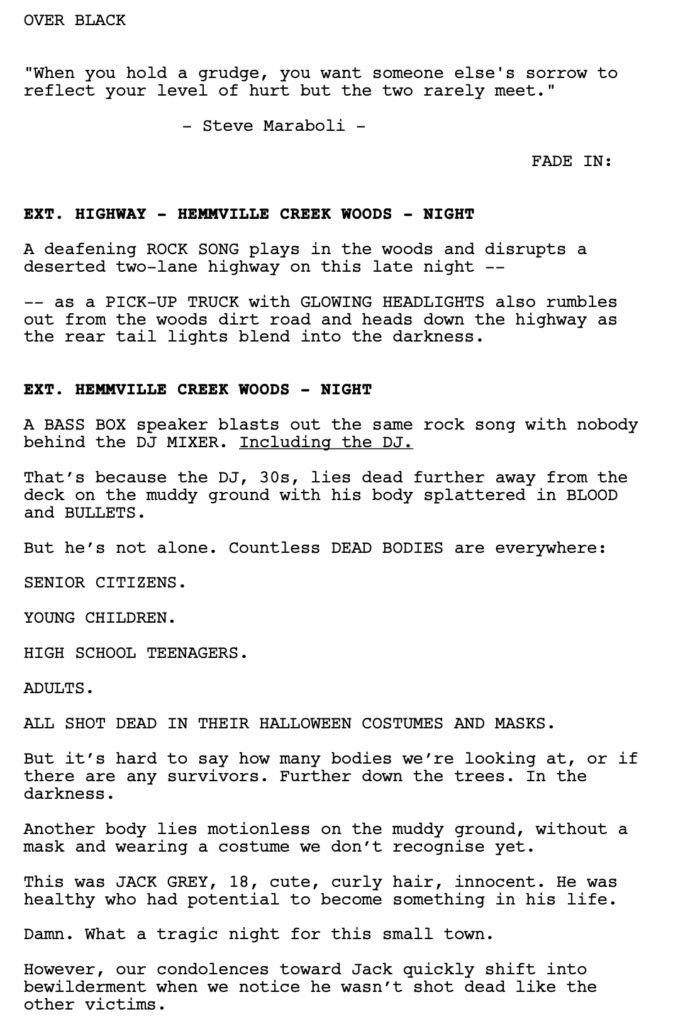
Sometimes, writing just isn’t easy to read. This has nothing to do with screenwriting per se. It’s more about writing in general. If I’m doing double-takes on basic sentences, that’s a problem. This second sentence here: …“as a PICK-UP TRUCK with GLOWING HEADLIGHTS also rumbles out…” Why, “also?” “Also” shouldn’t be a part of this sentence. “…from the woods dirt road…”. That doesn’t make sense. Later on the page we get, “He was healthy who had potential to become something in his life.” That’s a massive writing error on your first page! If this is what we’re going to get on page 1, the page that the writer pays the most attention to, then we, as readers, know that we’re going to get a lot more of that if we keep reading. So you gotta clear things up. Because, other than that, there’s something big going on here. There’s some potential to grab the reader with this opening. But if they’re fighting through the sentences, they can’t appreciate the story.
Logline (Whodunnit/Thriller/Drama): After her innocent 18-year-old son becomes the prime suspect to a Halloween party massacre in their small town, a Sheriff only has 13 hours to find the real killer before the FBI arrive and take over.
TITLE: DON’T SEND HELP
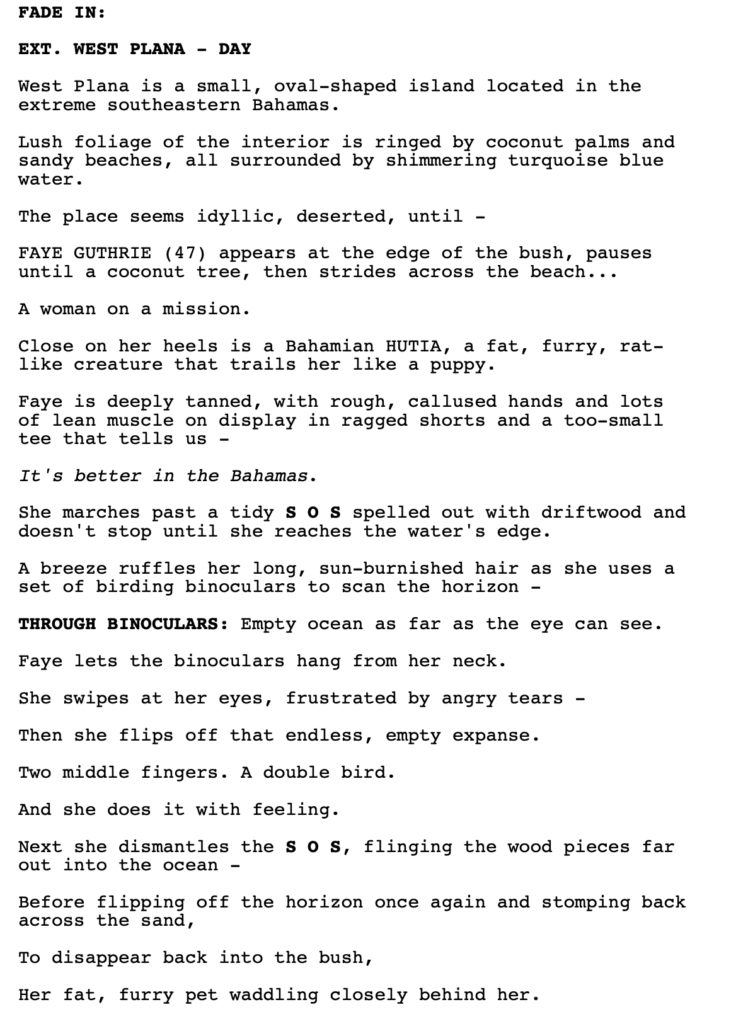
This is, actually, a solid page. I had about 250 entries. I’d put this in the top 40. Maybe top 30. We are establishing something interesting – which is that this woman is stranded on an island. That alone is worthy of getting people to turn the page. But is it the best opening Steph could’ve gone with? That’s debatable. Cause there’s nothing going in the scene. It’s a scene that is, solely, establishing information. It’s not doing so via any kind of dramatic situation. For example, if we started on this character sprinting through the jungle as we try and figure out why she’s doing so (Is she running towards something? Running away from something?). Then we hear a noise (a boat horn or a plane, maybe) and she emerges onto the beach (and this is where we realize she’s stranded on an island), she runs to the water to try and signal the passing vehicle. You’ve established the same thing you’ve established on the page you already have. But you’ve added a dramatic element. Or you can pull a reversal. Start on our heroine tanning in paradise. Establish the peaceful beauty. Then, ever-so-slowly, pull away from her, gradually establishing the beaten-up beach, the SOS sign, some remnants of former temper tantrums, until we realize she’s stranded on an island. Way more interesting than an on-the-nose, “FU” to the world for being stranded here.
Logline (Survival Drama): When a devoted wife and mother is rescued after being marooned on a deserted island for six months, her family is forced to reassess old behaviors, given that she’s lost her taste for living a normal, civilized life.
TITLE: HARD DOLLAR
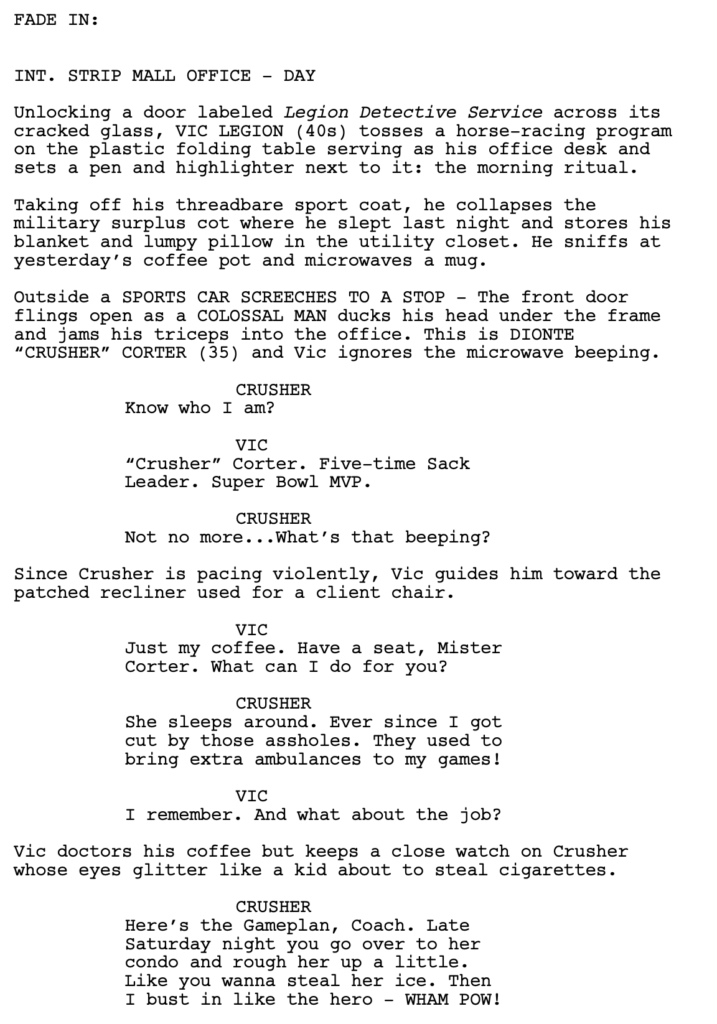
A couple of issues stick out to me right away. You’ve got three blocks of 4-line paragraphs. That’s going to agitate a lot of readers. Readers like to see white space. Not big chunky blocks of text right away. Another issue is one I see a lot, which occurs in the very first line: “Unlocking a door labeled Legion Detective Service across its cracked glass, VIC LEGION (40s) tosses a horse-racing program
on…” Notice how this line reads backwards. An action occurs before we’ve met the person performing the action. If you do that enough, it’s uncomfortable to read because we’re only forming an image AFTER the sentence, instead of right away. Instead, keep it basic. “VIC LEGION (40s) unlocks a door labeled ‘Legion Detective Service’ across its cracked glass.” It’s simple changes like this that make a big difference. I’d also try and give us a more unique opening. A guy shows up to a private eye cause his wife is cheating. That’s the most obvious possible way to start a script in this genre. Instead, look for ways to subvert the reader’s expectations. Give them an opening scene they wouldn’t expect to see in a detective noir.
Logline (Detective Noir): After narrowly surviving a brutal beating by his client, a private detective wakes up with achromatopsia, a condition where he can only see in black and white, and the voice of a drunken Humphrey Bogart offering him unsolicited advice on how to solve his cases.
TITLE: DO YOU FEAR WHAT I FEAR
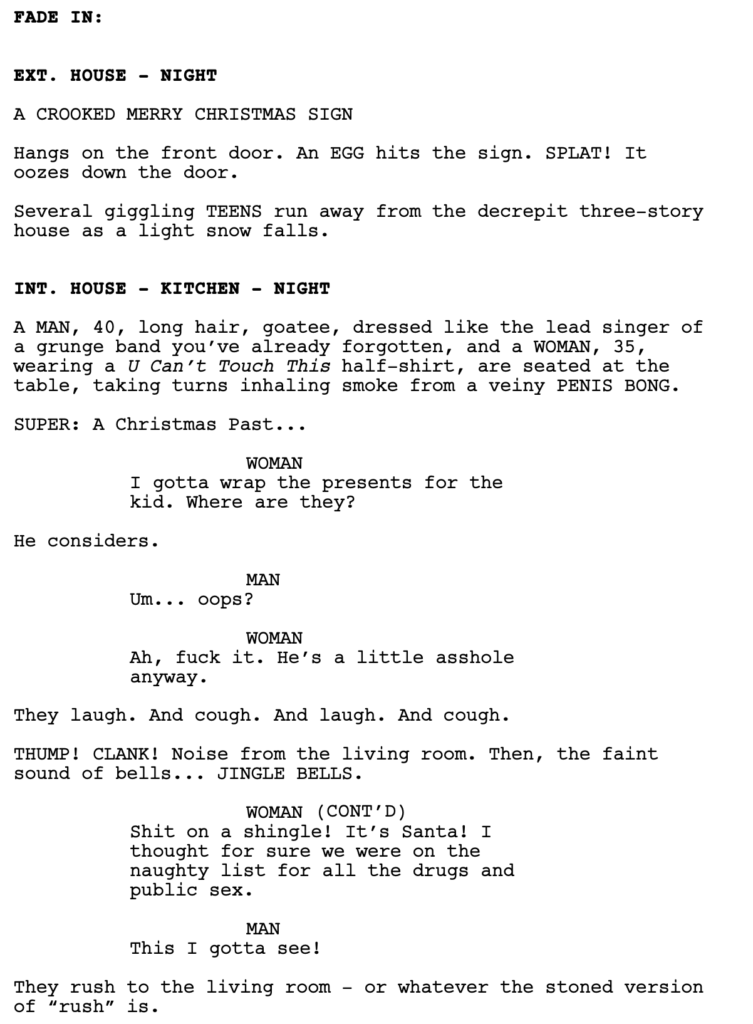
This is where screenwriting gets tricky. Here’s the writer’s pitch: “This is a Christmas horror comedy… I kinda love it… it’s like SCREAM meets ELF, but also a tribute to the fun 80’s horror movies I loved growing up like Night of the Demons, Return of the Living Dead, Night of the Creeps and Gremlins. It’s full of sex and violence and wrongness and fun.” It’s a fun pitch but the second I read this part — “Ah, f**k it. He’s a little a$$hole anyway.” They laugh. And cough. And laugh. And cough.” — I checked out. I hate these two people. It’s no different from a first impression. A girl could meet the man of her dreams but, if within the first five seconds, he accidentally spits on her while he’s talking, that’s all she sees. Any little mistake during a first impression has an outsized impact on the other person. Another thing to keep in mind is that comedy only starts working once you’ve established that type of comedy. If you have your highly sarcastic characters start off on page one saying sarcastic funny things, the reader doesn’t know they’re sarcastic yet! How could they? It’s the first page. So they may take their lines seriously. It’s only after being with the characters for 15-20 pages that we understand their sense of humor. So starting with a mean joke before you’ve established that as the dominant type of humor could turn off a lot of readers.
Logline (Horror/Comedy): After being fired by her not-so-jolly dad on Christmas Eve, a heartbroken Karen Claus discovers she’s the target of a masked killer grinch seeking revenge against Santa for the coal he received as a child.
TITLE: TRUTH, JUSTICE, AND THE AMERICAN WAY
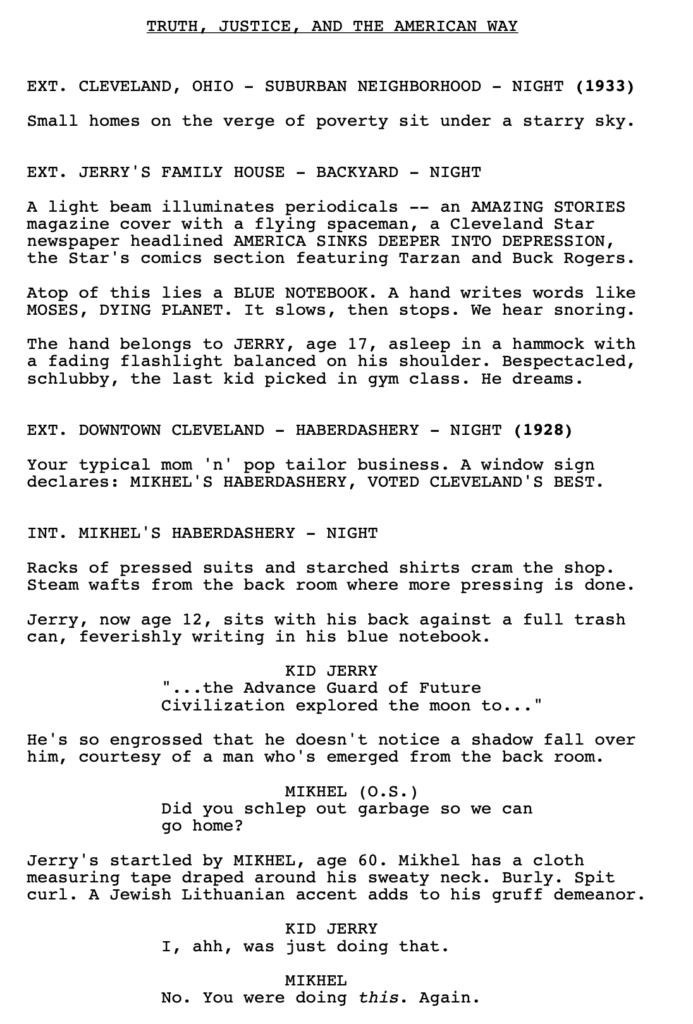
One thing you just can’t do is start your script with nothing happening then jump into a flashback. Why not just start in the flashback already????? What’s the point of seeing a person writing random words? Why is that worthy of creating a gummed up first scene with two time periods? It’s not. You don’t have time to mess around with screenplays. You’re always looking to get to the meat ASAP. Any time you’re not in the meat, you’re wasting the reader’s time. So if you are going to start with something before jumping into a flashback, make it a really big something where a lot is going on, not a small unimportant visual beat that leaves zero impression on the reader. Cause this is one of the few biopics I would probably be interested in. It’s the ultimate David vs. Goliath scenario. So use that first scene to grab us, not waste our time. You have freaking SUPERMAN for goodness sake. You’ll do yourself a huge favor by starting your first scene with Superman in it.
Logline (Biopic/Drama): The creators of Superman achieve the American dream, have it stolen, and fight like hell to regain it.
As always, I do logline consultations for $25! E-mail me at carsonreeves1@gmail to make sure you’re going into any e-mail query with your best logline.
Genre: Comedy
Premise: Two teenage feminists struggle to create the perfect boyfriend, only to watch their experiment deteriorate as he succumbs to the ultimate perpetrator of casual high school misogyny: the football team.
About: Screenwriter Julie Mandel Folly is building a nice resume. She wrote on the underrated half-hour comedy, “Welcome to Flatch,” which I enjoyed (the actress who plays the main character is hilarious). She also wrote on the well-received HBO show, Minx. Here, she’s teamed up with Hannah Murphy, who she worked with on the short comedy-horror film, The Spookening. Their script made the 2022 Black List with 7 votes.
Writers: Julie Mandel Folly & Hannah Murphy
Details: 100 pages
 Peyton List for Lizzie?
Peyton List for Lizzie?
As I come to terms with the unfortunate reality that we are nearly at the time change and that it’s going to start getting dark at 1pm and that LA gas is now at 15 dollars a gallon, I turn to screenplays to lift me out of my mini-depression. Please, oh screenplay Gods, provide me with a great screenplay to read.
It’ll be up to a couple of TV writers to catapult me out of my funk.
What I always worry about with TV writers writing features is the “solidness” of their writing. Everything in feature writing needs to be harder and clearer. The characters need clearly defined flaws. Act turns must be solid. Goals must be as clear as the Maui ocean. Cause unlike TV shows, features have ENDINGS.
Whereas, in the TV world, you’re constantly existing in this “soft” shapeless environment where there are no endings in sight. So you can drift in TV shows and not be so defined all the time.
Will today’s writers circumvent that trap? Admiral Ackbar, what do you say?
Caroline and Lizzie are 17 year olds who aren’t really nerds but they’re nowhere near the top of the high school pecking order. Lizzie is obsessed with losing her virginity to a hot boy she’ll never get and Caroline is gifted with smarts, so much so that she’s aiming to go to MIT.
After the two traverse over to the latest high school party and Lizzie fails, once again, to land her crush, Caroline pitches her an idea. What if she could bring a hot dead guy back to life? By doing so, not only will Lizzie finally lose her virginity (which would allow her to focus on more important things) but she’ll have a hot boyfriend to boot!
They dig up a recently dead hot guy, shock him back to life, and name him Leo Seacrest before informing him that he’ll be dating Lizzie. He gives no resistance to the idea whatsoever and, just like that, Lizzie loses her virginity. As a bonus, everyone in high school is enamored with Lizzie’s new boy toy.
But then Lizzie realizes that hanging out with the zombie version of Ken isn’t that interesting and breaks up with him. Caroline later comes to Leo to see if he’s okay, only to realize that she kind of likes him. And he likes her. Unexpectedly, the two become an item. Maybe this wasn’t such a bad idea after all!
Except then Leo starts hanging out with the dudest bros in dude-bro-land, Goose and Richie, both on the dreaded football team and DEFINITELY not feminists. Goose and Richie are shocked when they find out Leo hasn’t banged Caroline yet and construct a plan to get her drunk at the next party so that sexy times can happen.
When Caroline realizes that Leo is now a dude-bro and potential date-rapist, she regrets bringing him to life and proposes that they send him back six feet under. Lizzie wonders if that’d be murder, something the two cannot come to a consensus on, but they decide to do it anyway. So it’s goodbye, Leo. Unless he can somehow some way, be pulled out of his dude-bro tailspin.
Remember that time when I said TV writers have to be clear and defined.
Like, at the beginning of this review.
Yeah, well, our writers weren’t listening.
You see it right away in regards to motivation.
In any script, the reasons your characters are doing things needs to be as strong as possible. The weaker their motivation is, the less we’ll care.
Take a simple story. A cat is stuck in a tree.
In our first scenario, our hero is the cat’s owner. This has been his cat for fifteen years. Our owner loves this cat more than life itself. In our second scenario, this is not our hero’s cat. In fact, it’s the neighbor’s highly mean, highly annoying cat that hisses at our hero every morning.
Which scenario has the stronger motivation for our hero?
I don’t even need to write it, it’s so obvious.
That’s why motivation matters. So if you get motivation wrong, the reader detaches. They don’t care as much. I don’t care if the hero saves the mean cat who always hisses at him.
In Life of the Party, Lizzie’s motivation is to get laid. But it’s not clear how this is going to improve her life. She never makes it clear why getting laid is such a priority. We’re just supposed to accept that she wants it really bad. Caroline’s motivation is even murkier. She wants to get into MIT. If she can bring someone back to life, it improves her chances. We know this isn’t a real motivation, though, because she achieves her goal by page 30 (she brings a guy back to life). So her goal is over. What’s left to do? Why is she still so invested in Lizzie and Leo’s relationship? It’s all murky.
Another problem is the characters don’t act consistently. This is a huge one. You can’t make characters do things that they would never do just to move your story forward. Their actions must remain consistent with who they are. Once you betray your character’s reality, that character is dead in the reader’s eyes.
Here, Caroline is pitching bringing Leo back to life and Lizzie losing her viriginity to him as well as getting in a relationship with him. This is an absolutely crazy idea that no one in their right mind would do, of course. Which is exactly how Lizzie reacts. No way. She’s not going to bring someone back to life!
But then, a couple pages later, since the writers need Lizzie on board to make their story work, they have her change her mind and go along with it.
That’s not how screenwriting works. You have to stay consistent with your characters’ actions.
The thing is, there were creative ways around this problem. What they could’ve done is have Lizzie outright refuse: “I’m not digging up a dead guy, bringing him back to life, and having sex with him, Caroline. It’s out of the question!” Lizzie goes her own way and we stay with Caroline. Caroline then goes and does it all herself. She digs up Leo. She brings him back to life. She makes him look amazing. Then she shows up at Lizzie’s house and now Lizzie, who loves hot guys, is only reacting to what’s in front of her (a gorgeous guy). So she changes her mind and says she’s in.
Unfortunately, there were even more screenwriting errors in the script. The way they bring Leo back to life isn’t even believable in the confines of a comedy. They wheel him out of a garage during a storm and hope lightning strikes him (which it does) and then he’s magically alive? I can handle mistakes in scripts. But the one thing I cannot handle is laziness. If I feel like the writer is half-a$$ing it, I am done. I don’t have the time for someone who isn’t giving me their best.
And you’re trying to tell us that Caroline is a genius. How genius does that look? If you’re going to tell us someone is a genius, you gotta show them doing genius things. This is a show-don’t-tell medium. Like when Doc is explaining the time machine to Marty in Back to the Future. It’s really clever how the time machine operates. We believe what we’ve been told about Doc once he explains it to us (that he’s both crazy and a genius).
Unfortunately, this results in a story that’s mostly muck. We’re not really sure what we’re supposed to be doing here. Lizzie breaks up with the boring Leo at the midpoint. That was the entire objective of the story, getting them together. So why am I still turning the pages?
I guess you can make the argument that we’re curious to see what happens to Leo. But Leo is supposed to be the third most important character behind Caroline and Lizzie. So he shouldn’t be the engine for the screenplay. He should be more like the transmission. There’s some charm to Caroline’s pursuit of Leo and some cute moments when Leo turns to the dark side. But 1% of cute and charm isn’t enough to push me through an entire screenplay.
I know some of you get mad when I take a script off the Black List and don’t have anything positive to say about it because it made the Black List. So, obviously, it must be doing something right. Can you tell us what’s right so we can at least use that information to improve our own scripts?
I do like this concept. I think it’s fun. I like that, yet another pair of writers have wisely deconstructed a conceptual trope that used to be associated with guys (The “Weird Science” set up). If you’re a Barbie person, this script explores some similar themes in the way that Leo (aka “Ken”) has a spiritual awakening. So if you liked that film, there might be something for you here.
I just couldn’t get past all the technical errors, like the motivation, character inconsistency, the writers making things too easy for our heroes. And I just thought more could’ve been done with the story. This is a juicy premise. It’s got a lot of potential. I don’t feel like these writers sat down for a month and went through every possible avenue they could’ve taken this idea before picking the best one. It was more like, pick the most obvious direction, write the script in a month, we’re done. At least that’s how it felt to me. I need more than that from a script.
[ ] What the hell did I just read?
[x] wasn’t for me
[ ] worth the read
[ ] impressive
[ ] genius
What I learned: You don’t want agreement in screenplays. You want resistance. When they bring Leo back to life and tell him he’ll be Lizzie’s boyfriend, he agrees immediately. How interesting is that? Resistance breeds conflict. Conflict breeds drama. Drama leads to audience entertainment. So a simple fix here would’ve been to have Leo initially refuse to be Lizzie’s boyfriend and they have to convince him. Which, by the way, would’ve been a funny scene. So always lean towards resistance in storytelling. It’s more interesting 99% of the time.
One of the weirdest coolest crossovers I’ve ever read. Everything Everywhere All at Once meets Eternal Sunshine of the Spotless Mind meets When Harry Met Sally!
Genre: Rom-Com/Quirky/Sci-Fi/Drama
Premise: A relationship is put to the ultimate test when time ripples keep reinventing one of the partners, forcing the relationship to begin again… and again… and again… and again… and again…
About: I know Max Taxe has been writing since, at last, 2010, as I received a few e-mails from him back then. All that hard work is finally starting to pay dividends as he got a movie on HBO Max last year called, “Moonshot.” And now, this script is headed to Netflix via mega-production company, 21 Laps. I’m about to share some news that some of you may not like. But yes, this is yet another project that started out as a SHORT STORY. That’s how it was purchased (a pitch with a short story). Taxe then adapted it after he sold the rights into a full screenplay.
Writer: Max Taxe
Details: 98 pages
 Donald Glover for Miles?
Donald Glover for Miles?
Writers are back!
It looks like the studios and streamers finally wised up, realizing that every story AI produces reads like a fairy tale written by the Terminator. I’m not all mad at the strike though. It did give us The Golden Bachelor and 90 minute episodes of Survivor. And, of course, where we would be if Dave Filoni couldn’t write more episodes of Ahsoka? I’m not sure my Wednesdays could survive such a calamity. I need to find out what those space whales are up to!
I’ll be honest, I wonder how many professional writers wrote during the strike. Cause I know all any TV writer says is, “There’s not enough time.” So imagine if you had six months to catch up on your scriptwriting. Would Craig Maizon take that opportunity to scribble out a few Season 2 episodes of The Last of Us?
I guess we’ll never know.
But here’s something I do know. Today’s script subject matter is my kind of jam. You’ve got a little love. A little comedy. An offbeat writing voice. And then you’ve got a splash of sci-fi to disrupt it all.
Still one of my favorite scripts (that was sadly ruined by Pete Davidson, just like he ruined my chances with Emily Ratajkowski) was Meet Cute. It was similar to this premise. Girl uses a time machine to construct the perfect date. Why couldn’t the writer’s strike have disrupted that casting?
But will Ripple’s quirkiness overwhelm its charming premise? I’m going to channel my own personal 1.21 gigawatts to find out.
Miles and Sadie are two 30-somethings who have been unlucky in love. So much so that when they first meet, they openly admit that they expect their date to be a failure. But by doing so, they strip all expectations from the date, which allows them to have the best date of their lives and fall in love.
A few weeks later, some internet poster named XxNavi47xX says he’s from the future and provides winning lottery numbers to prove it. These numbers turn out to be correct and a bunch of people win money. However, this causes the first of many time ripples. Miles and Sadie’s cat, Trouble, turns into a dog. The way a ripple works is that you remember your past existence for about an hour, but that memory permanently disappears afterwards.
After this happens a few more times, Miles starts getting scared that a ripple may disappear Sadie (it already disappeared the all-girl band, Haim!). The internet connects him with a guy named Oz who has developed a system to help memories survive ripples. You write down your memories and a server bounces them back and forth a million times a second continuously so that they can migrate from one ripple to the next.
This way, when Sadie does, of course, disappear, Miles remembers her and goes after her. But, unfortunately for our lovebirds, the craziness is just getting started. It’s followed a month later by another one. And then a few weeks later by another one. In one reality, she’s the lawyer she was originally going to be before her lawyer father committed suicide. In another, she’s a hairdresser. In yet another, she’s a movie star.
Miles is able to keep finding her and get back together with her but then Navi is forced to go on the run which really starts affecting the timeline. Miles is forced to through thousands of ripple variations to find Sadie again. We can see the toll it’s taking on him and realize it’s not sustainable. At a certain point, Miles is going to have to decide whether his love for Sadie is strong enough to live this hell of an existence.
You know, I always say, if a script takes more than two genres to label, that means you’ve got a script that doesn’t work. Well, this might be the first exception. It really is a myriad of different genres and yet, somehow, it works.
I’m surprised they bought this concept as a short story pitch. Because with a script like this, it’s all about the execution. And the execution for something that exists in the murky world of time travel can go bad quickly. It’s a testament to the power of short stories in this new ultra-attention-deficit-disorder industry. I don’t think this sells if it’s only a pitch. The short story was enough of a bridge to allow 21 Laps to see where the script might go.
And it goes to some interesting places.
It starts off as this straight up rom-com, almost to the point of being cloying. The “meet cute” at The Apple Pan restaurant is too cutesy-pootsy for its own good, even as it attempts to subvert expectations.
I wouldn’t even say the script was saved by its first ripple. Because when that first ripple happens, we don’t know how deep into the concept the writer is going to go yet. It turns out, very deep.
Once we’re in the throes of over a hundred ripples, we start to feel the desperation of Miles, as well as the realization that he may have to come to terms with letting Sadie go. Cause the ripples just keep happening and his entire existence is dedicated to re-finding Sadie and starting their love story over again.
But just imagine how taxing it must be to do that hundreds of times over, with a new person that has a completely different past, only to lose them again a week later. It’s pure misery. And one of the most powerful moments in the script is when the 700th version of Sadie says to him, I’m not the person you met. I’m a copy of a fragment of a reincarnation of that person. You just need to move on.
It was heartbreaking.
But I think where Taxe really earns his writer’s stripes is in how he controls the technical side of the story. He uses this time traveler guy – Navi – as a way to influence the frequency and severity of the ripples. At first, when he’s in hiding, just posting anonymous internet comments, the ripples are soft and spaced out. But when he goes on the run, the ripples start getting more intense. Then, as the government closes in on him, they grow more intense still.
This ensures that the script is constantly changing. I always complain about how screenplays get predictable, both with what happens and how the story is paced. The way Taxe treats Navi guarantees a lot of variety in both these departments.
And I loved how, when the government finally caught him, it meant that whatever timeline we were in was the final one. No more Ripples. And in this timeline, Miles and Sadie had decided never to be together. So we’re really sad that their love story is over.
I will say this as a sci-fi geek (spoiler adjacent). There was a part of me that REALLY WANTED Sadie to be Navi. And we find out that the reason she’s been resetting her timelines was to get to a timeline where her dad was still alive. But, of course, that would’ve created some other plot messiness that might not have been able to be explained. So I’m okay with Navi being random.
I went back and forth on whether this was a double worth the read or an impressive. Cause the first half is above average. It’s enough to keep you turning the pages. But it wasn’t until I got to the last 40 pages that I truly got pulled into the story. You know what, though? It got me at the end. That final ending beat was perfect. And when a script leaves me on that high of a note, I gotta give it an impressive, man!
[ ] What the hell did I just read?
[ ] wasn’t for me
[ ] worth the read
[x] impressive
[ ] genius
What I learned: One of the best ways to get noticed is to deconstruct a genre. Take a well-known genre in a direction we don’t expect. This script takes romantic comedy to the last place I expected it to go. If you want to learn how to deconstruct a genre, read “Ripple.”
”The Continental” draws heavy inspiration from The Godfather. Does it work?

You gotta give it to the John Wick people.
They optimistically charged into a seemingly impossible task.
They took a franchise built on top of thin characterization, thinner mythology, and overly-impressive production value and migrated it to a medium that’s all about characterization, needs mythology to thrive, and doesn’t have the money to pull off great production value.
But this is what Hollywood does. It expands. And it often expands without thinking. David Goyer was just talking about this on the Happy Sad Confused podcast last week. He was writing the DC movies when Marvel blew up and he was getting non-stop notes from the studio that they had to accelerate their plans to expand their universe, leap-frogging over a second Superman film to do Batman vs. Superman instead.
That decision was widely criticized for breaking the DCEU, as it attempted to expand a universe that hadn’t yet set its foundation.
Building a show around the famous hotel in John Wick (The Continental) sounds good in practice. It’s a hotel that houses assassins. I mean, how cool is that? But this is what’s tricky about screenwriting. “General coolness” isn’t the best starting point for a movie or a show. You need a more focused idea, even for television. The more specific you can get, the better.
Gray’s Anatomy, one of the longest running shows on television, wasn’t about “a hospital in Seattle.” It was about a group of first year doctors thrown into the fire in a hospital in Seattle. And if you want to get more specific, it was about a young woman whose mother, one of the most successful doctors in the nation, had recently been diagnosed with early-onset dementia, and the challenges our heroine had of trying to navigate the hospital as a first year doctor, helping her mother, as well as living up to her reputation.
In other words, you can’t just say, “The Continental, cool assassins” and you’re finished. You have to come up with an actual idea, something that can be expanded out into a compelling story.
So what did the writers come up with?
They decided to focus the story on the man who would eventually become the manager at the Continental, Winston Scott, and set the show 50 years prior, in the 70s. Young Winston is some big shot businessman who lives a straightforward life. He’s unexpectedly called into the world of the Continental after his black sheep brother, Frankie, who he hasn’t seen in ages, steals a literal mystery box from the infamous hotel.
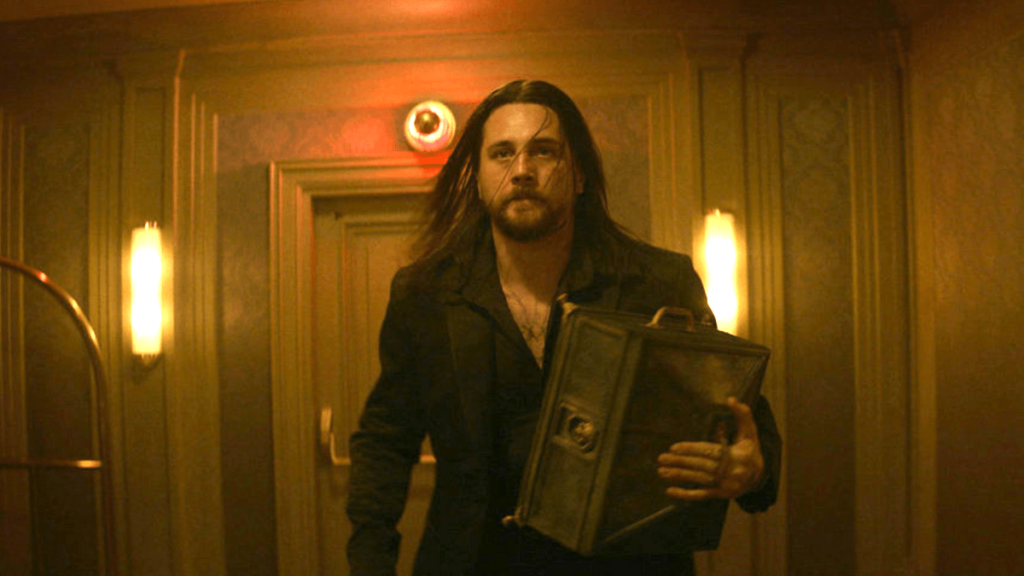
The current manager of The Continental, Cormac O’Connor (Mel Gibson), kidnaps Winston to bring him in, and demands that he find Frankie for him, so he can get his mystery box back. This sends Winston into a criminal underground which he is unfamiliar with. This storyline intersects with a couple of others, including a rookie cop, KD, who wants to know more about the mysterious Continental hotel, and a team of funky criminals who use a karate dojo as cover for their small-time criminal operation.
The Continental starts out strong. My favorite moment is when Frankie uses the cover of a big party in the Continental to break into the hotel from the subway, going up through several floors to where a giant safe is. Then he hooks onto the safe with a chain that goes all way down to the subway, where an anchor dangles and waits for a train to come. The train hooks onto the anchor, yanking the the safe door off and allowing Frankie to complete his heist. It’s quite clever.
This is followed by a fun stairway escape set piece where Frankie is having to take on assassins that are both below and above him. I always say, the best set piece you can write is one where the reader is convinced there’s no way out. And it truly feels like there’s no way out for Frankie. But through brute perseverance, he somehow takes everyone down and escapes.
I was in at that point, crafting my application letter to the Continental Fan Club.
Unfortunately, the rest of the show never quite lives up to that opening. It does have a clear goal – Cormac (and by proxy, Winston) needs to get that box back. And it does have some mystery. What’s in that box?? It also has a little Godfather to it in that Winston is the outsider. He doesn’t want anything to do with the criminal world. So it’s a fun idea to force him into that world. And, of course, we know he’s going to end up just like Michael Corleone. So, technically, we’re invested in that transformation.
But that’s where The Continental made its first mistake. For something like this to truly hit, Winston has to be a BONA FIDE outsider. Cause we’re going for a “fish-out-of-water” narrative here, with a non-criminal being forced to engage with the criminal world. All the fun is in the contrast. That’s where your conflict is going to come from and the conflict will breed the drama that powers your episodes.
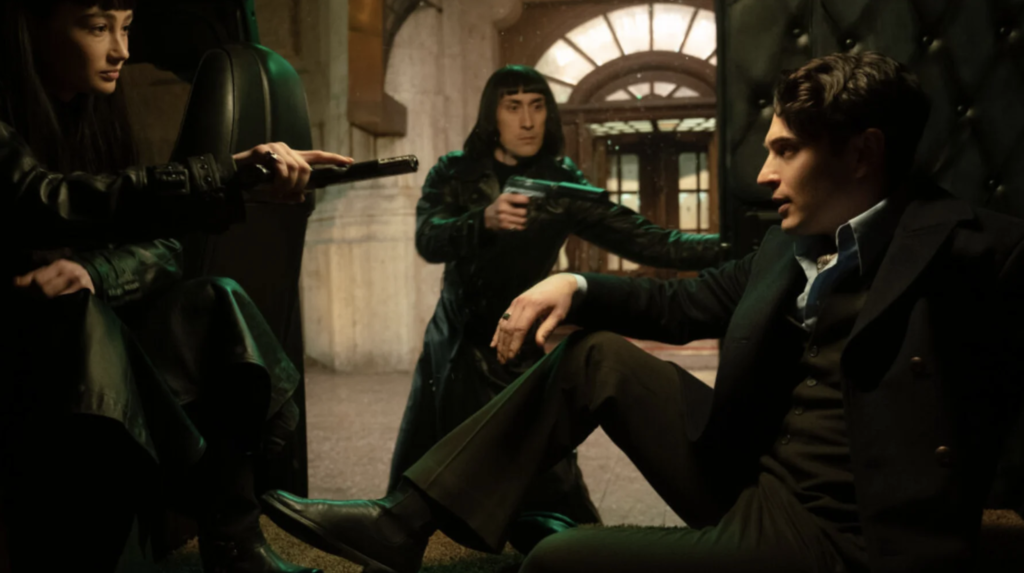
The problem was, Winston never felt that out of water. He was more like a fish being carried around in his own personal fish tank. Cause whenever he walked into a dangerous criminal situation, such as when he went looking for Frankie at the Funky Bunch Karate Dojo, his demeanor remained as calm and collected as if he’d received a preview of the John Wick movies from a time-traveling visitor, leaving him utterly assured of his survival and unfazed by any potential threats.
There’s a better creative option here. If Winston was more of a dainty nerdy financial guy who is all brains and no muscle, then we’re milking the fish-out-of-water scenario. Which is what you want! If he’s already comfortable being a bada$$, where’s the potential character growth? Cause that’s how he was in the movies.
The biggest problem with The Continental is that it doesn’t give us a character to love. We kinda like some of these characters. But we don’t love any of them. They could’ve easily fixed this by making Winston a true underdog. Place him a million miles away from the criminal world. Make him more of a nerd. The guy shouldn’t even know how to hold a gun. The more of an underdog he is, the more we would’ve loved him. I guarantee it.
In fact, I would argue that Frankie would’ve been a better Winston than Winston. Because, even though Frankie was a criminal, he was a rough-and-tumble plays-by-his-own rules criminal. He’s the opposite of the refined respectful professional criminals who work and stay at The Continental.
So at least with him, we can imagine how much he would need to go through to become Winston. A lot. Whereas the current Winston is already basically Winston from the movies.
The other big problem with this show is one that has nothing to do with the writing, and something I hate thinking about because I’m the screenwriting guy and I want to believe that any problem can be solved by the writer. But the truth is that every show you turn on for the first time is dependent on there being at least one actor who you say, “I want to know more about them.” There’s some perfect cosmic marriage between actor and character that, irrespective of the show, you just want to see more of them. The Continental does not have that.
I remember when I first saw Lost. That feeling happened almost a dozen times. Every actor who popped on screen, I said, “I want to know more about this person.” And, unfortunately, if you don’t have that, it’s almost impossible to overcome it. So, bad casting work by the show’s casting department.
I will say that they’re spending some legit dolla bills on this show. There are a lot of moments that could’ve been in John Wick movies. And setting the story in the 1970s does give the John Wick universe that slightly different feel required to separate the show from the films. And Mel Gibson as the big baddie looks to have potential.

I’m just not convinced they have a real story to tell here. And that probably has to do with the fact that they’re building the show on one of the thinnest cinematic universes ever created. And I’m a John Wick fan! It’s a fun cinematic universe! But it was never a universe designed for depth.
What’d you guys think?


